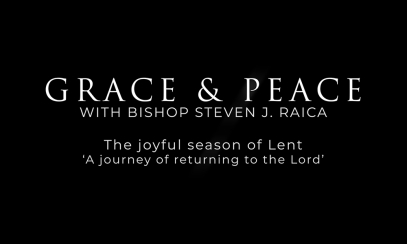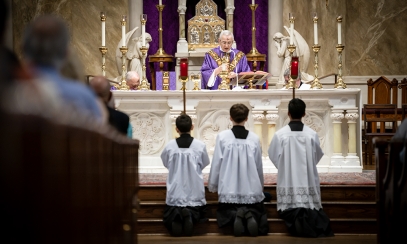
The Marriage Tribunal
Searching for truth and striving for the salvation of souls
Searching for truth and striving for the salvation of souls
My sisters and brothers, from the beginning, the Church has always taken marriage seriously. We believe the words the couple say in the marriage ceremony: “I take you to be my husband/wife, to have and to hold, from this day forward, for better or worse, richer or poorer, in sickness and in health, until death do us part.” Whenever both parties are baptized, the marriage reaches the dignity of an unbreakable bond in the sacrament of matrimony which perdures to the death of one of the parties. Marriage for us, as was intended by God, is an institution for life. Both parties of the couple should know why they are entering this union. They should be of minimally sufficient maturity to understand what marriage entails. There should not be any deception or errors when a couple make their vows. There shouldn’t be anything that would compromise the full awareness of the individuals making those vows in order to contract a valid marriage.
My sisters and brothers, from the beginning, the Church has always taken marriage seriously. We believe the words the couple say in the marriage ceremony: “I take you to be my husband/wife, to have and to hold, from this day forward, for better or worse, richer or poorer, in sickness and in health, until death do us part.” Whenever both parties are baptized, the marriage reaches the dignity of an unbreakable bond in the sacrament of matrimony which perdures to the death of one of the parties. Marriage for us, as was intended by God, is an institution for life. Both parties of the couple should know why they are entering this union. They should be of minimally sufficient maturity to understand what marriage entails. There should not be any deception or errors when a couple make their vows. There shouldn’t be anything that would compromise the full awareness of the individuals making those vows in order to contract a valid marriage.
The mission of the Tribunal is to respect the rights of those who truly seek marriage. Sometimes it happens that certain questions arise regarding the status of persons. Was the marriage contracted in a proper manner? Was the correct form observed? What were the true and real intentions of the couple at the time of marriage? Did they intend to fulfill the obligations of marriage with regard to their openness to the gift of children? Did they intend that the marriage would be “for life”? Were there any deep psychological impediments that would have compromised the freedom of one party or the other when they made their marital consent?
These are some of the many questions the Tribunal study when cases are brought. At the outset, because it is not something we do every day, the process can seem daunting. It can seem so legalistic and cold, especially in an era where everything is based on the feelings of the parties. Nevertheless, to determine the status of persons through the well-established Tribunal process, requires a detailed and deep understanding of the facts as they pertain to a couple at the moment when the marriage was contracted. All this is compared to the Church’s radiant teaching on marriage, what constitutes a marriage, and the noble purpose it serves in the Church and society. All this signifies that we must take seriously the facts as they are known. The judges in the Tribunal have an arduous task of making a determination of status whenever they apply the law to the facts and reach a moral certitude about their decision. No two cases before the Tribunal are alike. Therefore, the tribunal must exercise its prudence and expertise in rightfully determining the status of the persons. Similarly, an individual, or a couple, who has asked that their case be studied need to cooperate with the requirements and be patient as the case makes its way through the Tribunal process. The process itself helps to guarantee the objectivity of the process along with respect for the rights of the parties. Taken together, the Tribunal seeks to arrive at the truth of the situation.
What does the Tribunal not do? In the marriage cases brought before it, the Tribunal does not vindicate rights of one party over the other. That is to say, it doesn’t determine one party was right and the other party was wrong or guilty. Rather, it is a serene process seeking to discover the truth of a situation when the marriage was contracted. Were all the factors present that needed to be there, or were some key critical factors missing?
In the end, I have heard from countless individuals over the years that, even though they found the process difficult, the outcome provided a closure that immensely helped a couple with the healing process. It further clarifies their status within the Church and enables individuals to chart a new chapter for themselves. All in all, many find an inner peace of conscience as they enter more deeply in the life of the Church. With the assistance of the Tribunal, they can receive the sacraments with serenity of heart.
The ultimate goal of any pastoral care offered, even in the judicial process, is one that strives for the “salvation of souls.” For this reason, it is necessary that the Tribunal be exceedingly careful in its work as it seeks to uphold the dignity of the sacrament of marriage, as instituted by God, helping those involved to understand the greater purpose of living the Christian life.
Finally, the activity of the Tribunal in most areas deal with the spiritual effects of a marriage and not its civil implications. The civil status is determined by the laws of a given state. The spiritual effects are the proper jurisdiction of the Diocesan Tribunal.
I am so very grateful for the range of judicial officials who have accompanied individuals as they approach the Tribunal to resolve their questions. I am also thankful for the expertise in the Tribunal Staff who take every case seriously and carefully. Finally, I’m grateful for the many individuals and couples who have been served by the Tribunal so they can better live the Christian life.



